|
|
|
Sort Order |
|
|
|
Items / Page
|
|
|
|
|
|
|
| Srl | Item |
| 1 |
ID:
185169
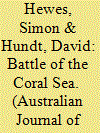

|
|
|
|
|
| Summary/Abstract |
Australia has not been alone in declining the opportunity to take part in China's Belt & Road Initiative (BRI). Instead, this article contends, Australia launched its own infrastructure initiative in the Pacific that has attempted to reduce the attractiveness of the BRI to the region. The article focuses on Australia’s intervention in the Coral Sea Cable System, an action which vastly reduced the role of Chinese firms such as Huawei in building telecommunications infrastructure in the Pacific. Informed by a postcolonial perspective, we explain Australia’s stance on the BRI in terms of its intimate but at-times problematic relations with Asia and the Pacific. This was reflected in Australia’s unwillingness to acknowledge the legitimacy of the BRI as a foreign policy initiative, in its invocation of the ‘rules-based order’ to justify its intervention in the cable project, and in the design of its regional infrastructure program, which bore some uncanny resemblances to what Australian policymakers have depicted as the worst aspects of the BRI itself.
|
|
|
|
|
|
|
|
|
|
|
|
|
|
|
|
| 2 |
ID:
134246
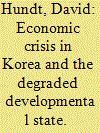

|
|
|
|
|
| Summary/Abstract |
This article analyses the Korean developmental state since the late 1990s, and argues that the state has continued to play a weighty role in the economy. The state guided industrial and financial restructuring after the Asian economic crisis, and intervened to stimulate the economy during the 2008 global financial crisis. In doing so, state elites have displayed a distinctive form of economic leadership that is largely consistent with the developmental state. Rather than focusing predominantly on performance-related indicators of state strength such as growth rates, this article analyses the deeper aspects of the developmental state, specifically its internal functions and its collaboration with business. The article brings politics back into analysis of the developmental state by questioning the assumption that strong economic performance is necessary for the maintenance of close ties between the state and chaebol. Instead, economic performance is better understood as a predictor of patterns of conflict and cooperation. Long-standing ties between the state and big business have endured two significant economic crises, even if the performance of the developmental state has been degraded compared to earlier decades.
|
|
|
|
|
|
|
|
|
|
|
|
|
|
|
|
| 3 |
ID:
163466
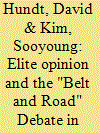

|
|
|
|
|
| Summary/Abstract |
This article analyzes elite opinion in South Korea as it applies to China's One Belt, One Road initiative (OBOR), in order to better understand how a prominent Asia-Pacific middle power and US ally is approaching this development. Through a close analysis of the writing of foreign-policy elites in South Korea from 2013 to 2017, the study finds that OBOR was generally depicted as significant to China's re-emergence in regional and global affairs, but not as wholly detrimental to South Korean interests. Elites did not speak with one voice, but presented the government with a comparatively sanguine view of OBOR. The debate, we illustrate, created unlikely alliances between left- and right-leaning elites about some aspects of the initiative, but it also revealed tensions among conservative and centrist elites. In seeking to demonstrate their relevance to policy makers, however, elites inadvertently underlined their growing distance from the general public.
|
|
|
|
|
|
|
|
|
|
|
|
|
|
|
|
| 4 |
ID:
084980
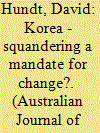

|
|
|
|
|
| Publication |
2008.
|
| Summary/Abstract |
In winning the presidential and legislative elections of 2007-8, the Grand National Party and its leader Lee Myung-bak have attained a potentially unique opportunity to influence South Korea's political, economic and diplomatic trajectory. This paper reviews Korea's 'once in a generation' election and prospects for change under President Lee. Despite the political capital accrued from his party's landslide victories, Lee appears set to replicate previous incumbents of the presidency, each of whom has been overwhelmed by the high expectations of the public on the one hand, and the harsh constraints imposed by Korea's geopolitical position on the other.
|
|
|
|
|
|
|
|
|
|
|
|
|
|
|
|
| 5 |
ID:
181036
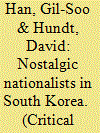

|
|
|
|
|
| Summary/Abstract |
The 2016–2017 Candlelight Revolution was one of the most significant events in recent South Korean politics, but little attention has been paid to the powerful conservative counter-movement that accompanied and followed the candlelight protests. This counter-movement was symbolized by demonstrations by flag-carriers who found Park Geun-Hye’s impeachment and Moon Jae-In’s inauguration incomprehensible. They argued that Park was innocent, called for her release from prison, and claimed that Moon’s election was illegitimate. An analysis of speeches made during conservative counter-protests between 2016 and 2019 illustrates how these activists reject the values of a new era in South Korean political and economic life. Instead, their speeches conveyed a clear desire to have the legacy of the industrialization generation recognized in contemporary South Korea. These flag-carriers are evidence that a marginalized set of desires and aspirations about South Korean nationalism and identity coexist with the progressive views of the candlelight protesters. The persistence of such an intense and partisan worldview, however, poses a threat to the future of liberal democracy in South Korea.
|
|
|
|
|
|
|
|
|
|
|
|
|
|
|
|
| 6 |
ID:
109963
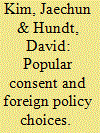

|
|
|
|
|
| Publication |
2012.
|
| Summary/Abstract |
It is usually assumed that US policy makers need to generate popular consent in order to undertake regime change against another state. This article explores the ways in which contextual factors such as the joint democracy effect, popular values and public moods influenced efforts by elites in the United States to generate popular consent for regime change in the Philippines and Chile. Against the backdrop of the Vietnam War, the United States undertook covert action in Chile due to public recognition of the target state's democratic credentials and a public mood opposed to further military ventures. In contrast, the absence of a strong joint democracy effect, a national mood infused with romantic nationalism qua militarism and social Darwinism facilitated efforts by US elites to generate consent for the invasion and occupation of the Philippines. Subsequently, this article contributes to understandings of the domestic-level factors that influence foreign policy decisions.
|
|
|
|
|
|
|
|
|
|
|
|
|
|
|
|
|
|
|
|
|